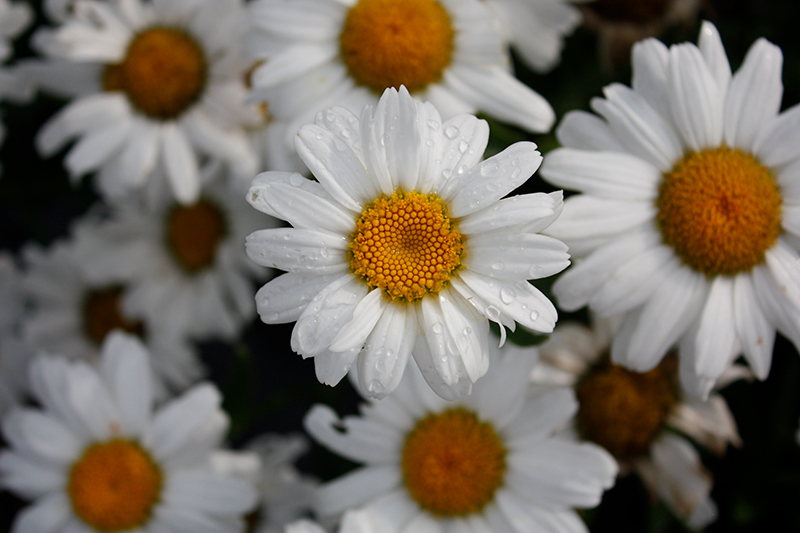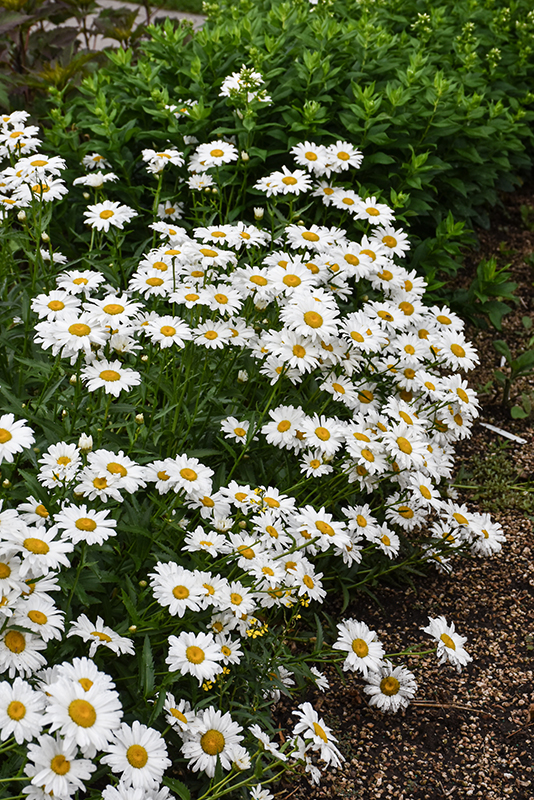Plant Finder
Flower Power Shasta Daisy
Leucanthemum x superbum 'Flower Power'
Plant Height: 24 inches
Flower Height: 3 feet
Spacing: 18 inches
Sunlight:
![]()
![]()
Hardiness Zone: 5
Description:
This vigorous variety with a dense, bushy habit, produces large, semi-double, white daisy blooms that contrast with the dark green foliage; perfect for edging or massing along borders; deadhead to encourage re-blooming
Ornamental Features
Flower Power Shasta Daisy has masses of beautiful semi-double white daisy flowers with gold eyes at the ends of the stems from early summer to early fall, which are most effective when planted in groupings. The flowers are excellent for cutting. Its serrated narrow leaves remain dark green in color throughout the season.
Landscape Attributes
Flower Power Shasta Daisy is an herbaceous perennial with an upright spreading habit of growth. Its medium texture blends into the garden, but can always be balanced by a couple of finer or coarser plants for an effective composition.
This plant will require occasional maintenance and upkeep, and should be cut back in late fall in preparation for winter. It is a good choice for attracting butterflies to your yard. Gardeners should be aware of the following characteristic(s) that may warrant special consideration;
- Insects
Flower Power Shasta Daisy is recommended for the following landscape applications;
- Mass Planting
- Border Edging
- General Garden Use
- Container Planting
Planting & Growing
Flower Power Shasta Daisy will grow to be about 24 inches tall at maturity extending to 3 feet tall with the flowers, with a spread of 24 inches. When grown in masses or used as a bedding plant, individual plants should be spaced approximately 18 inches apart. The flower stalks can be weak and so it may require staking in exposed sites or excessively rich soils. It grows at a fast rate, and under ideal conditions can be expected to live for approximately 5 years. As an herbaceous perennial, this plant will usually die back to the crown each winter, and will regrow from the base each spring. Be careful not to disturb the crown in late winter when it may not be readily seen!
This plant does best in full sun to partial shade. It does best in average to evenly moist conditions, but will not tolerate standing water. To help this plant achive its best flowering performance, periodically apply a flower-boosting fertilizer from early spring through into the active growing season. It is not particular as to soil type or pH. It is highly tolerant of urban pollution and will even thrive in inner city environments. This particular variety is an interspecific hybrid. It can be propagated by division; however, as a cultivated variety, be aware that it may be subject to certain restrictions or prohibitions on propagation.
Flower Power Shasta Daisy is a fine choice for the garden, but it is also a good selection for planting in outdoor pots and containers. With its upright habit of growth, it is best suited for use as a 'thriller' in the 'spiller-thriller-filler' container combination; plant it near the center of the pot, surrounded by smaller plants and those that spill over the edges. It is even sizeable enough that it can be grown alone in a suitable container. Note that when growing plants in outdoor containers and baskets, they may require more frequent waterings than they would in the yard or garden. Be aware that in our climate, most plants cannot be expected to survive the winter if left in containers outdoors, and this plant is no exception. Contact our experts for more information on how to protect it over the winter months.

